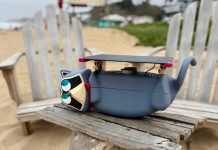US Navy Command Chief Aaron Seibert didn’t expect to come home from his third tour of duty in Iraq with a Purple Heart.
Embedded as an advisor, his responsibility was to help an Iraqi transition team secure a patrol base. But life took a turn four months into his deployment when the jovial corpsman was standing on a porch next to a Humvee, taking photos of distant smoke plumes. That’s when a mortar hit nearby, shooting hundreds of razor sharp shrapnel pieces throughout his body.

A pin could drop in the dining room of The Five Crowns this past Tuesday during the Newport Beach Sunrise Rotary breakfast where Chief Seibert was the keynote speaker. As he talked about his near-death experience, and what he has learned since, the room sat riveted, myself included, trying to comprehend what it would be like to be given your Last Rites far from home, yet survive to tell the story and its lesson.
“When the mortar hit, I turned around and at first I thought I was hit in the back. It was very confusing and for a moment I couldn’t figure out what had happened,” explained Seibert. “The first thing I tried to do was look at my hands to see if they were still attached to my body. There was so much shrapnel under my skin I couldn’t feel them.”
As a Chief Petty Officer in the Navy, Seibert had been a medical corpsman, and survived the blast in part by being able to give some well-trained Marines who were in the vicinity instructions to help them treat his severe wounds.
The air around them was thick with white smoke and particulate, making it hard to breathe or see anything. “I felt as though I had fallen from a ten-story building flat on to a concrete sidewalk, the pain was so deep it penetrated straight through my bones.”
As fellow soldiers ran to help, Seibert talked a Marine through the necessary steps to stop the bleeding of an artery in his leg that was threatening his life. As they began removing his boots and clothing, it was obvious his wounds were far worse than they thought and shock was setting in. That’s when he was given his Last Rites.

When Seibert finally arrived at the hospital, nearly 100 pieces of shrapnel had to be removed from all over his body, primarily from his intestines, and he nearly lost his leg.
Thanks to the excellent care he says he received from the Navy, he miraculously survived and began the long process of healing, physically and mentally, an uphill battle that he says was far from easy, and continues, but for which he feels he has received exemplary care.
And though he came in as an injured sailor, today he has become an active member of the Wounded Warrior Battalion-West (WWB-W), now helping his fellow soldiers overcome similar experiences.
“For many of us, it’s an honor to bear the burden of combat, because we love this country so much,” explained Seibert. “But that same training also makes it hard to ask for or take help from people. I am trying to help the guys I meet with understand that it’s important not to pull so far back emotionally that you can’t get back. That it is vital to attend each and every physical therapy session or PTSD (Post-Traumatic Stress Disorder) meeting in order to get back to living, and to find reasons for hopes and dreams after what they’ve suffered.”
For Seibert, a big part of his recovery has been to get out on the road with his wife and visit the America that he nearly died protecting. For many in the WWB-W, there is a need to answer the burning question of what America has to offer today after all they’ve lost. Experiencing America has helped, but as he observed, “I am always amazed at how many foreigners are traveling around our country and not more Americans. Americans need to get out there!”
“It’s amazing what you see in countries like Iraq – the poverty and disease, horrible infrastructure, dirt roads, no plumbing, all of the things we take advantage of here in the States, like Polio and other vaccinations for children, which they don’t have over there.”
He ended on a thoughtful note. “We have so much to be grateful for here in America. I was in the military for 15 years before I was wounded, but if I had to do it all over again, I would go back, because it’s the people here at home that make this country roll. Americans need to get out and see this country to fully appreciate and respect all we have here. ”
For more information about the Newport Beach Sunrise Rotary, visit newportbeachsunriserotary.org. To learn more about the Wounded Warrior Battalion-West, visit www.woundedwarriorregiment.org. For donations, send directly to: “Dept. of Navy Gift Fund” (Memo line: WWB-W), 3025 John Quick Road., MCB Quantico, VA 22134, c/o: Charitable Donations Coordinator.
Lynn Selich resides in Newport Beach. She can be reached at LynnSelich@yahoo.com.





Awesome… Thank you for giving us the “real story” that rarely gets in
even the national press. Aaron is a hero we can emulate, laud, and genuinely
admire. To all of our servicemen and women, we can’t thank you enough for
our peace and freedoms.
Thank you for bringing attention to our military heroes. In thanks for our freedoms, we need to show more appreciate for their service.
Thank you Lynn, for bringing us Chief Aaron Seibert’s story. It’s a shame that our ‘national’ news programmers are disinterested and wilfully choose to remain silent on the fates of those who serve their country.